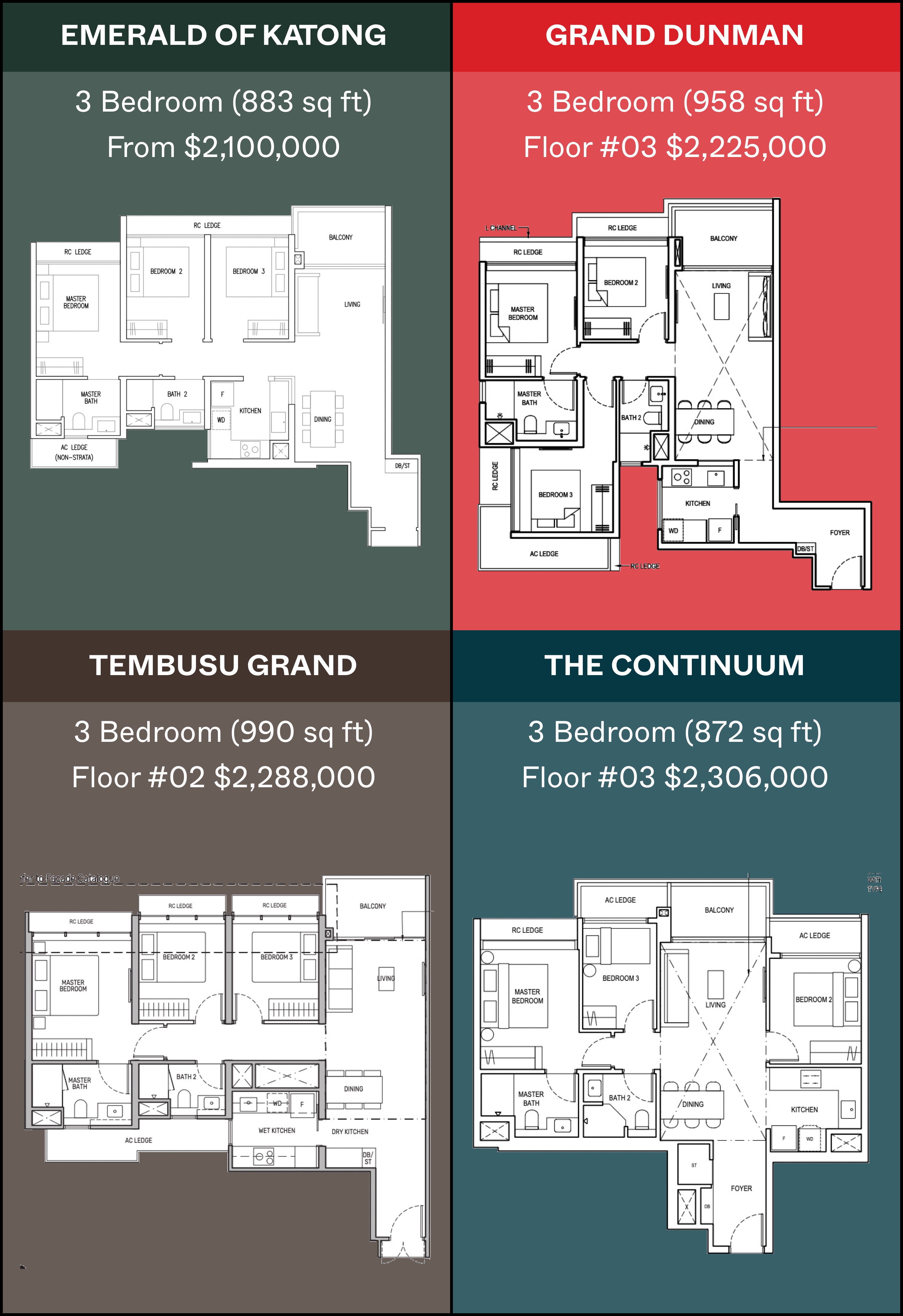How Property Agents In Singapore Select Their Own Homes (And What You Can Learn)
January 25, 2025

When buying a home, who better to learn from than the experts? If you’re like many buyers, you may wonder whether your estate agent would follow the same advice they’re giving you. Would they make the same choices they’re encouraging you to make? This week, rather than focusing on the usual homeowner experiences, we decided to ask some real estate agents how they would choose their own homes (whether private or HDB). The answers may surprise you, as many are as straightforward as they are demanding:
So many readers write in because they're unsure what to do next, and don't know who to trust.
If this sounds familiar, we offer structured 1-to-1 consultations where we walk through your finances, goals, and market options objectively.
No obligation. Just clarity.
Learn more here.
1. “Do your own homework” isn’t something they take literally
Despite the saying, we found that many agents don’t do their own homework and, surprisingly, engage other professionals to help.
This approach acknowledges a critical truth: even experienced agents might not be experts in every area or property type.
These estate agents mentioned they would consider consulting another industry professional for insights, as well as to save time. One reason is that a property agent isn’t necessarily an expert in the area where they want to buy a home. Another reason is the issue of “blind bias.”

Agents tend to develop certain theories and strategies over time, such as the famous “sell-one-buy-two” strategy or the “worst-house-in-the-best-neighbourhood” approach. This can result in unconscious biases towards certain projects or property progression strategies, and it helps to have another estate agent point it out. For instance, one agent abandoned her belief that landed homes appreciated better than other property types, after insights from a more senior agent. She said:
“While I believe in freehold landed as the best long-term asset, my fellow agent highlighted that even my current flat – which I bought following her advice – had seen better returns than the landed cluster.” The agent hadn’t paid much attention to how fast HDB flats or other segments could appreciate, which left a gap in her knowledge.
It’s a good kind of humility to have, especially if you’re involved in the property market in some way (e.g., you’re in a tangential field like construction, you work for a developer, or so on). It also highlights a practical truth: there’s too much to know for anyone to go it alone. Even with hours of research on portals and forums, a qualified agent’s second opinion can provide insights that transform your decision-making.
No matter how much you’ve explored various property portals, forums, etc., it’s still best to get a second opinion from a qualified agent.
2. Market conditions are not the main factor
Agents have access to more data than the average buyer. However, we found that – as much as they like to present graphs, tables, interest rates and so on to time the property market – agents are no more willing to time the property market than any other buyer.
The theories that are commonly used during sales pitches, such as “first mover advantage” or the benefits of freehold status, often take a backseat to personal needs. One estate agent shared an example of why she bought a resale flat, despite almost always recommending new launches to clients. This wasn’t a case of deception, but rather a matter of personal circumstance:
“New launches appreciate better than resale properties. But I chose resale because my mum could no longer live on her own, and we needed a place where she could move in with us right away.“
A key takeaway from this is that, even if the market presents an opportunity, even when market conditions present opportunities, the “best time to buy” or the “best property to buy” is deeply personal. Your circumstances—like family needs, urgency, or lifestyle—often outweigh theoretical advantages or market trends.
That said, many agents still emphasised the importance of balancing personal priorities with market knowledge. They suggested that while timing the market may not always be practical, understanding the bigger picture can help buyers make more informed decisions that align with their unique situations.
3. One eye toward future buyers
While most homebuyers focus solely on their own needs, agents often consider the preferences of future buyers selecting properties. Our theory is that this happens because agents spend more time thinking about how others would respond to a property, rather than themselves.
One example was an agent who didn’t believe in Feng Shui at all, yet still rejected a terrace house because the neighbour’s external facade had crossing lines, which formed diamond shapes—an element considered inauspicious in certain Feng Shui practices for its energy-trapping properties.
Another agent, whose child is already at university, was still adamant about his home being within enrolment distance of certain primary schools. The reason was that – even though his children no longer needed it – he wanted to appeal to prospective buyers from nearby HDB upgraders, who would be seeking access to schools. This was also the reason he chose to buy in the Clementi area, despite having a personal preference for the East.
This may not be particularly relevant if you intend to live in your home indefinitely and have no concerns about resale. However, if you’re an owner-investor, or if the house isn’t going to be your final stop, this approach might be worth considering to maximize resale potential and attract the right buyers when the time comes.
4. Early access for agent buyers
Okay, buckle in because this one is going to ruffle some feathers.
We’ve seen some angry comments about agent buyers at Emerald Of Katong. This was when it came out that some of the early buyers were agents themselves (although this isn’t unusual for new launches.)

Agents do sometimes have early access to prime units at new launches, making them the earliest of the “early birds.” We’ve heard that some agents have managed to secure units even before the first VVIP previews, allowing them to lock down the best units in the best stacks. These provide buying opportunities that the rest of us don’t have, with the caveat that we haven’t been able to substantiate many of the claims. For obvious reasons, no one really wants to discuss it in detail.
We can’t replicate this tactic, as we’re not agents. But we can take note of how coming in at different sales phases matters, for new launches.
So while agents may have the advantage of earlier access, non-agent buyers can still prepare themselves by gathering as much information as possible in advance. Understanding the project’s details, unit layouts, and pricing allows you to make swift, informed decisions and secure the best available units during the sales phase.
It’s not just about early-bird discounts, but also about being able to secure units with better views, the corner units, the units with the most efficient layouts, and so on. If you find out a new launch is in its very final sales phases – or already completed – you might want to reconsider if you still want it at that point.
5. Moving much quicker than most regular buyers
The agents themselves didn’t seem to realise this, so we’ll point out how many of them were able to make their decisions in a very short time – in one case, just two weeks.
Property agents seem to have internalised the notion of compromise. Many of the agents understand that there’s no “perfect” home that will tick all the boxes. They’re more willing to overlook traits that regular homebuyers may cling to, such as the insistence that a property must be freehold, or that it must be within a certain district. One of the traits is the willingness to settle for a home close to a desired location, without insisting on being in the location itself. This was a factor we saw in the fast launch sales of Parc Esta – some of the buyers were willing to settle for being one stop away from Paya Lebar, rather than being in Paya Lebar itself.
We also heard from one agent who settled on a cheaper property in Buona Vista, when his original intent was to live in Holland Village.
Besides the willingness to compromise, agents tend to be quicker with their offers and acceptance. This provides an advantage, as they face fewer risks of being outbid. We also suspect that, because agents see property prices rising all the time, they’re less likely to “dawdle” and end up paying more later.
6. Coming into a viewing with more points of comparison
Probably the biggest difference between agents and regular buyers is that agents see different layouts all the time. This is literally their job, all day every day. This gives them a decided edge during viewings.
A good example of how many agents see layouts can be found here, where we show a comparison between Emerald Of Katong and nearby projects.

An agent is more likely to notice, for instance, that another project offers an added study or a larger master bedroom, for the same price as the one they’re viewing.
As a regular buyer, you probably don’t have the time or access to view a dozen or more properties in the same area. What you can do, however, is develop a habit of checking floor plans. Just like a property agent, note that the layout – and not just the simple square footage – has more practical value. A 900 sq. ft. unit with a larger master bedroom, or one where rooms can be more easily merged, may be more useful than a 1,200 sq. ft. unit with awkward corridor spaces or an unnecessarily large balcony.
When we spoke to the agents, almost all of them based their decisions on the quality of the layout, rather than whether their unit was technically bigger by a certain number of square feet.
At Stacked, we like to look beyond the headlines and surface-level numbers, and focus on how things play out in the real world.
If you’d like to discuss how this applies to your own circumstances, you can reach out for a one-to-one consultation here.
And if you simply have a question or want to share a thought, feel free to write to us at stories@stackedhomes.com — we read every message.
Ryan J. Ong
A seasoned content strategist with over 17 years in the real estate and financial journalism sectors, Ryan has built a reputation for transforming complex industry jargon into accessible knowledge. With a track record of writing and editing for leading financial platforms and publications, Ryan's expertise has been recognised across various media outlets. His role as a former content editor for 99.co and a co-host for CNA 938's Open House programme underscores his commitment to providing valuable insights into the property market.Need help with a property decision?
Speak to our team →Read next from Property Advice

Property Advice We Sold Our EC And Have $2.6M For Our Next Home: Should We Buy A New Condo Or Resale?

Property Advice We Can Buy Two HDBs Today — Is Waiting For An EC A Mistake?

Property Advice I’m 55, Have No Income, And Own A Fully Paid HDB Flat—Can I Still Buy Another One Before Selling?

Property Advice We’re Upgrading From A 5-Room HDB On A Single Income At 43 — Which Condo Is Safer?
Latest Posts

Overseas Property Investing This Singaporean Has Been Building Property In Japan Since 2015 — Here’s What He Says Investors Should Know

Singapore Property News REDAS-NUS Talent Programme Unveiled to Attract More to Join Real Estate Industry

Singapore Property News Three Very Different Singapore Properties Just Hit The Market — And One Is A $1B En Bloc




































0 Comments